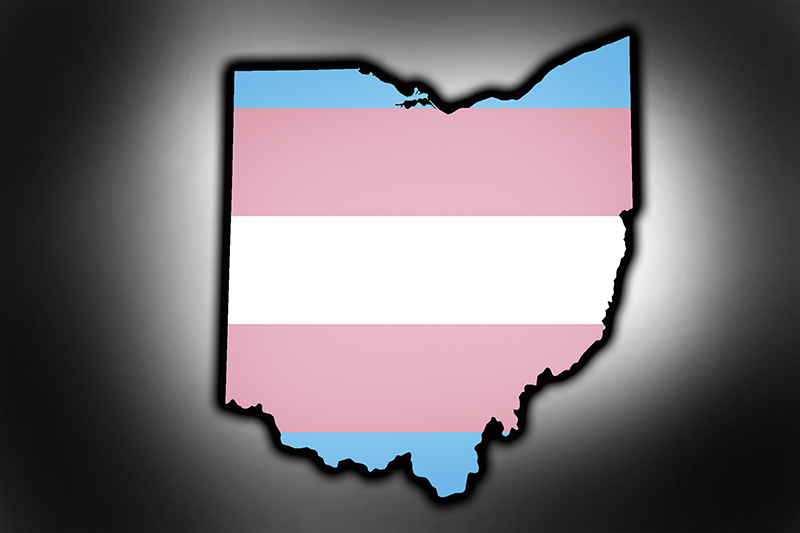Americans Divided on Including LGBTQ Topics in Classroom Instruction
Americans are divided, but more amenable to allowing LGBTQ history to be taught in schools than discussions on LGBTQ identity.

A recent national tracking poll find Americans overwhelmingly support teaching sexual education in schools, but are divided when it comes to the discussion of LGBTQ-related topics, with a plurality of Americans supporting the teaching of LGBTQ history but opposing the teaching of sexual orientation and gender identity.
The poll, conducted by Morning Consult, surveyed 4,410 adults between April 20-23, asking Americans various questions, including how comfortable they’d be with the idea of teachers broaching certain topics in schools, ranging from the Civil Rights movement to slavery to evolution to religion. Some of those questions also asked about sexual education and LGBTQ content.
According to the poll, 68% of respondents either “strongly” or “somewhat” support sexual education being taught in K-12 schools, with only 23% of those polled opposed. There is support among all a majority of respondents based on political party identification, although only 51% of Republicans support sex ed being taught in schools, compared to 68% of independents and 82% of Democrats.
The poll also breaks down the opinions of parents versus non-parents, with 68% of parents and 67% of non-parents “strongly” or “somewhat” supporting sexual education curriculum in schools. Among parents, support from Democrats reaches a high of 78%, compared to 70% of independents and 55% of Republicans. Among non-parents, 83% of Democrats support such curriculum, while 70% of independent non-parents do, and only 50% of Republicans do.
However, the poll does not delve into how comprehensive or detailed that sexual education curriculum should be. As such, the poll may understate the level of opposition to sexually-related topics, such as whether a teacher broaches the issue of birth control or condom use, which may garner more backlash from parents compared to a “bare-bones” biologically-based overview that doesn’t go into significant detail.
But there is less overwhelming support for any curriculum lessons or classroom discussions that touch on LGBTQ-related topics, with more obvious partisan and ideological divides. For instance, only 50% of adults say they’d be either “very” or “somewhat” comfortable “leaning children are being taught lessons on LGBTQ history at school, compared to 40% who say they’d be “somewhat” or “very” uncomfortable.
Among Democratic respondents, 69% said they’d be comfortable with knowing LGBTQ history was being taught in schools, compared to 50% of independents and only 27% of Republicans. Among parents, 49% overall say they’d be comfortable with the theoretical idea of such topics being taught in school.
Democratic parents say they’d be theoretically comfortable by a 67%-28% spread, while only a plurality of independent parents, 47% say they’d be comfortable, compared to 40% who would be uncomfortable. Republican parents overwhelmingly oppose LGBTQ history being acknowledged in school, with 54% saying they’d be uncomfortable with such topics being broached in the classroom, compared to 32% who say they’d be comfortable.
Nearly identical numbers of parents responded similarly when asked if they’d be comfortable knowing their own children were being taught LGBTQ history in schools, with 50% saying they would compared to 39% who would not. Again, Democratic parents were more comfortable, by a 69%-26% spread, while independent parents said they’d be comfortable by a 51%-39% spread, while Republican parents said they’d be uncomfortable by a 56%-32% spread.
Among non-parents, 50% overall say they’re comfortable with teaching LGBTQ history, with 70% of Democratic non-parents saying they’d be comfortable, 53% of independent non-parents saying they’d be comfortable, and only 25% of Republican non-parents saying they’d be comfortable with such topics.
Interestingly, Republicans are the only political sub-group where non-parents are more conservative than parents regarding discussions about LGBTQ history. According to Morning Consult, that difference is partly driven by ideology, age, and association, as GOP parents are less likely to identify as “conservative,” are generally younger, and more likely than non-parents to say they personally know someone who is LGBTQ — which is generally a key factor to greater acceptance.
Among both parents and non-parents, across all political ideologies, support for LGBTQ history curriculum is higher among those who know an LGBTQ person than those who don’t.
However, when it comes to broaching the issue of sexual orientation or gender identity in a non-historical context, a plurality of adults, or 45% say they “somewhat” or “strongly” oppose such topics being taught or discussed in K-12 schools, compared to 41% who say they “strongly” or “somewhat” support the idea. Democrats are more supportive, with 61% supporting allowing discussions of LGBTQ identity, compared to only 40% of independents and 18% of Republicans.
Parents and non-parents largely hold similar views on discussions of LGBTQ identity in schools, with only 41% supporting the idea, compared to 44% of parents and 45% of non-parents opposing the idea. Fifty-eight percent of Democratic parents support the concept, while only 38% of independent parents and 24% of Republican parents do. Among non-parents, 61% of Democrats, 41% of independents, and only 15% of Republicans do. Again, the trend holds that Republicans are the only political sub-group where non-parents are less comfortable than their peers with children when it comes to discussing LGBTQ-related topics.

Given the results on discussing sexual orientation or gender identity, it is not shocking that an earlier poll by Morning Consult found a majority of Florida voters support the so-called “Parental Rights in Education” law, also dubbed the “Don’t Say Gay” law, especially since proponents of the law emphasized provisions barring the discussion of LGBTQ identity from kindergarten through third grade, and requiring such discussions to be “age-appropriate” or “developmentally appropriate” at the secondary and high school levels.
That said, despite the proliferation of the “groomer” narrative — pushed by social conservatives, in which teachers are regularly accused of trying to “indoctrinate” children by either exposing them to inappropriate content or attempting to influence their views on various issues — the April Morning Consult poll found that Americans overwhelmingly trust teachers. Eighty-three percent of those polled agreed more with the statement that “The majority of teachers act in good faith to teach children a curriculum that teaches them to think for themselves,” compared to only 17% who agreed with the statement “The majority of teachers act in bad faith to teach children a curriculum that teaches them to think in a way that aligns with teachers’ personal views.”
Eighty-nine percent of Democratic respondents overall believe teachers act in good faith, compared to 81% of independents and 77% of Republicans. Among parents, 81% believe teachers act in good faith, with 84% of Democrats, 80% of independents and Republicans agreeing with that sentiment. Among non-parents, 91% of Democrats agree, 82% of independents agree, but only 76% of Republicans agree.
Despite generally pro-teacher sentiment, Morning Consult noted in its write-up of the poll that the Republican Party’s focus on LGBTQ topics in the classroom — a divisive issue, even when just limited to the inclusion factually-based, historical information about LGBTQ figures — “could capitalize on declining trust in the public education system, especially among Republicans, who are more likely than the broader population to believe classroom instructors have influence on children’s values and their sexuality and gender identity.”
That said, 72% of Americans polled said they are comfortable with LGBTQ people “working with their children,” including 83% of Democrats, 72% of independents, and 56% of Republicans. Seventy-two percent of parents agree, with 83% of Democratic parents, 75% of independent parents, and 56% of Republican parents saying they’re comfortable with the idea. However, disparities exist between parents who know or associate with an LGBTQ person, 80% of whom are comfortable with LGBTQ adults working with their children, compared to only 55% of parents who don’t know an LGBTQ person.
Annise Parker, the president and CEO of LGBTQ Victory Fund, said that much of the success enjoyed by proponents of laws restricting discussions around LGBTQ content in schools stems from a lack of familiarity, especially with respect to the transgender community, as many Americans do not personally know or associate with a transgender person.
“One of the reasons we’ve made such great progress over the years in terms of how the public perceives people who are gay and lesbian is because of proximity — knowledge of people coming out individually. The transgender issue is still unknown for a lot of folks,” she said. “For an issue that it took some education for my own community to come to grips with, we shouldn’t be surprised it’s much harder for the broader society.”
That may also be why even proponents of the Florida law — or their counterparts in other states seeking to pass similar legislation — generally bring up concerns about “gender ideology” or children socially transitioning without parent’s knowledge, rather than directly attacking gay or lesbian people, same-sex marriage, or even the presence of LGB teachers in the classroom. Because more Americans have become familiar with gay, lesbian, or bisexual individuals over the years, the degree of “panic” over their existence or presence in schools is limited to a small subset of conservatives.
That said, Tim Miller, a former Republican strategist who worked on Jeb Bush’s 2016 presidential campaign, told Morning Consult that the focus by state lawmakers on the idea of LGBTQ topics being broached in classrooms is a salient issue, due in part to parental angst and anger stemming from how schools handled the COVID-19 pandemic. Particular in states where in-person instruction was slower to resume and students engaged in “virtual” learning, some more conservative parents been to balk at the introduction of topics or lessons they saw as disconcerting, inappropriate, or disagreeable — ranging from how teachers tackle the issue of race and racism in history class, or the inclusion of books with LGBTQ characters.
“Right now, they think it’s a winner,” he said of Republican politicians’ emphasis on the issue. “And it probably is a mild one — because it’s being tucked into this broader conservation about what’s appropriate in schools and ‘woke’ indoctrination of students.”
Support Metro Weekly’s Journalism
These are challenging times for news organizations. And yet it’s crucial we stay active and provide vital resources and information to both our local readers and the world. So won’t you please take a moment and consider supporting Metro Weekly with a membership? For as little as $5 a month, you can help ensure Metro Weekly magazine and MetroWeekly.com remain free, viable resources as we provide the best, most diverse, culturally-resonant LGBTQ coverage in both the D.C. region and around the world. Memberships come with exclusive perks and discounts, your own personal digital delivery of each week’s magazine (and an archive), access to our Member's Lounge when it launches this fall, and exclusive members-only items like Metro Weekly Membership Mugs and Tote Bags! Check out all our membership levels here and please join us today!


























You must be logged in to post a comment.